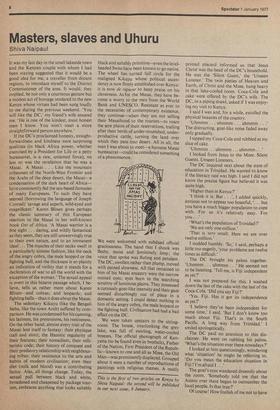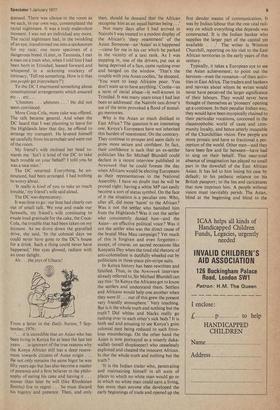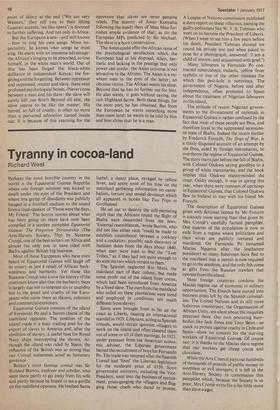Masters, slaves and Uhuru
Shiva Naipaul
It was my last day in the small lakeside town and the Kenyan couple with whom I had been staying suggested that it would be a good idea for me, a traveller from distant regions, to introduce myself to the District Commissioner of the area. It would, they implied, be not only a courteous gesture but a modest act of homage rendered to the new Kenya whose virtues had been sung loudly to me during the previous weekend. 'You will like the DC,' my friend's wife assured me. 'He is one of the kindest, most honest men I know. You won't meet a more straightforward person anywhere.'
If the DC's proclaimed honesty, straightforwardness and kindness were surprising qualities (in black Africa power, whether exercised by a President for Life or a petty bureaucrat, is a raw, untamed force), no less so was the revelation that he was a Masai. A Masai . . . Like the mountain tribesmen of the North-West Frontier and the Arabs of the deep desert, the Masai—a condensation of the dark heart of Africa— have consistently fed the sex-based fantasies of many Europeans. To such they have seemed (borrowing the language of Joseph Conrad) 'savage and superb, wild-eyed and magnificent.' Karen Blixen gives perhaps the classic summary of this European reaction to the Masai in her well-known book Out of Africa. 'A Masai warrior is a fine sight . . daring, and wildly fantastical as they seem, they are still unswervingly true to their own nature, and to an immanent ideal ... The muscles of their necks swell in a particularly sinister fashion, like the neck of the angry cobra, the male leopard or the fighting bull, and the thickness is so plainly an indication of virility that it stands for a declaration of war to all the world with the exception of the woman.' The sexual appeal is overt in this bizarre passage which, I believe, tells us rather more about Karen Blixen—and cobras; and leopards; and fighting bulls—than it does about the Masai.
The sedentary Kikuyu (like the Bengali babu, like the town Arab) suffered by comparison. He was condemned for his cunning, his laziness, his pretensions, his restiveness. On the other hand, almost every trait of the Masai lent itself to fantasy: their physique (tall and slim); the Hamitic regularity of their features; their nomadism; their militaristic code; their history of conquest and their predatory relationship with neighbouring tribes; their resistance to the arts and habits of modern civilisation; even their diet (milk and blood) was a contributing factor. Alas, all things change. Today, the sexual pull between black and white, broadened and cheapened by package tourism, embraces anything that looks suitably
black and suitably primitive—even the levelheaded Swiss have been known to go native. The wheel has turned full circle for the maligned Kikuyu whose political ascendency is now firmly established over Kenya: it is now de rigueur to heap praise on his cleverness. As for the Masai, they have become a worry to the men from the World Bank and UNESCO. Resistant as ever to the necessities of contemporary existence, they continue—when they are not selling their Masaihood to the tourists—to roam the sere plains of their reservations, trailing after their herds of under-nourished, underproductive cattle, turning the land over which they pass into desert. All in all, the man I was about to meet—a humane Masai bureaucrat—could be considered something of a phenomenon.
We were welcomed with subdued official graciousness. The hand that I shook was fleshy, moist and femininely limp; the voice that spoke was fluting and petulant. The DC, swollen rather than plump, moved with pained slowness. All that remained to him of his Masai ancestry were the narrow nomad eyes; eyes born to the searching scrutiny of luminous plains. They possessed a curiously goat-like intensity and their gaze seemed disturbingly out of place in a domestic setting. I could detect nothing in him of the angry cobra, the male leopard or the fighting bull. Civilisation had had a bad effect on the DC.
We were taken upstairs to the sittingroom. The house, overlooking the grey lake, was full of swirling, water-cooled breezes. The official photograph of Kenyatta (to be found even in brothels), Father of the Nation, First President of the Republic—known to one and all as Mzee, the Old Man—was prominently displayed. Grouped about it were a number of reproductions of paintings with religious themes. A neatly This is the first of two articles on Kenya by Shiva Naipaul: the second will be published in our next issue, 8 January. printed placard informed us that Jesus Christ was the head of the DC's household. He was the 'Silent Guest,' the 'Unseen Listener.' The twin pieties of Heaven and Earth, of Christ and the M zee, hung heavy in that lake-cooled room. Coca-Cola and cake were offered by the DC's wife. The DC, in a piping drawl, asked if I was enjoying my visit to Kenya.
I said I was and, for a while, extolled the physical beauties of the country.
`Uhmmm uhmmm . . . uhmmm . . The distracting, goat-like noise faded away only gradually.
I sipped my Coca-Cola and nibbled at my slice of cake.
`Uhmmm uhmmm uhmmm I looked from Jesus to the Mzee. Silent Guests. Unseen Listeners.
The DC inquired next about the state of education in Trinidad. He wanted to know if the literacy rate was high. I said I did not know the precise figure but believed it was quite high.
'Higher than in Kenya ?'
'I think it is. But . .', I added quickly,
anxious not to appear too boastful, but you have a much bigger population to cope with. For us it's relatively easy. For you...,
'What's the population of Trinidad ?' 'We are only one million.'
'That is very small. Here we are over twelve million.'
I nodded humbly. `So,' I said, perhaps a little too eagerly, 'your problems are twelve times as difficult.'
The DC brought his palms together. 'Uhmmm . uhmmm. ..' He seemed not to be listening. 'Tell me, is Fiji independent as I wyet ?a'
s not prepared for this. I washed down the last of the cake with the last of the Coca-Cola. 'Did you say Fiji ?'
'Yes. Fiji. Has it got its independence as yet ?'
'I believe they've been independent for some time,' I said. 'But I don't know too much about Fiji. That's in the South Pacific. A long way from Trinidad.' I smiled apologetically.
The DC paid no attention to this disclaimer. He went on rubbing his palms. 'What's the situation over there nowadays ?'
I looked at him questioningly, wondering what 'situation' he might be referring to. `Do you mean the education situation in Fiji ? I'm afraid I ...'
The goat's eyes wandered dreamily about the room. 'Somebody told me that the Asians over there began to outnumber the local people. Is that true?'
Of course! How foolish of me not to have
guessed. There was silence in the room as we each, in our own way, contemplated the racial nightmare. It was a truly malevolent moment. I was not an individual any more. The racial nightmare had, in the twinkling of an eye, transformed me into a spokesman for my race; one more specimen of a dangerous breed. (Later, in Tanzania, I met a man on a train who, when I told him 1 had been born in Trinidad, leaned forward and whispered in a sickening mockery of intimacy, 'Tell me something. How is it that you people get everywhere ?')
To the DC I murmured something about constitutional arrangements which ensured etc ... etc ...
'Uhmmm . . . uhmmm . . .' He did not seem convinced.
More Coca-Cola, more cake was offered. The talk became general. And when the DC heard that I was planning to leave for the Highlands later that day, he offered to arrange my transport. He levered himself up carefully from his armchair and went out of the room.
My friend's wife inclined her head towards me. 'Isn't it kind of the DC to take such trouble on your behalf! I told you he was a nice man.'
The DC returned. Everything, he announced, had been arranged. I had nothing to worry about.
'It really is kind of you to take so much trouble,' my friend's wife said aloud.
The DC was deprecatory.
It was time to go: our host had clearly run out of small talk. We rose and made our farewells, my friend's wife continuing to exude loud gratitude for the cake, the CocaCola, the trouble that had been taken on my account. As we drove down the gravelled drive, she said, 'In the colonial days we could never have gone to the DC's house for a drink. Such a thing could never have happened.' Her eyes glowed, radiant with an inner delight.
Ah ... the joys of Uhuru!
From a letter in the Daily Nation, 7 September, 1976:
it is incredible that an Asian who has been living in Kenya for at least the last ten years ... is ignorant of the true reasons why the Kenya African still has a deep resentment towards citizens of Asian origin . . . He not only remains the same bigot he was fifty years ago but has also become a master of pretence and a firm believer in the philosophy of eating his cake and having it . . . sooner than later he will (like Rhodesian Smiths) live to regret . . . he must discard his bigotry and pretence. Then, and only then, should he demand that the African recognise him as an equal human being ...'
Not many days after I had arrived in Nairobi I was treated to a modest display of the African's 'deep resentment' of the Asian. Someone—an 'Asian' as it happened —came for me in his car which he parked in the vicinity of a taxi rank. As I was stepping in, one of the drivers, put out at being deprived of a fare, came rushing over and banged on the window. 'That's the trouble with you Asian coolies,' he shouted. 'You want to keep Africans poor. You don't want us to have anything.' Coolie—as a term of racial abuse—is well-known in Trinidad. It was many years since I had last been so addressed: the Nairobi taxi driver's use of the term provoked a flood of nostalgic memories.
Why is the Asian so much disliked in East Africa ? The question is an interesting one. Kenya's Europeans have not inherited this burden of resentment. On the contrary. They continue to prosper and seem daily to grow more secure and confident. In fact, their confidence is such that an ex-settler politician like Sir Michael Blundell could declare in a recent interview published in Newsweek that he could foresee the day when Africans would be electing Europeans as their representatives in the National Assembly. I have no doubt that he will be proved right: having a white MP can easily become a sort of status symbol. On the face of it the situation is a peculiar one. Who, after all, did more 'harm' to the African ? Was it not the settler who banished him from the Highlands ? Was it not the settler who consistently denied him—and the Asian—an effective political voice ? Was it not the settler who was the direct cause of the brutal Mau Mau campaign? Yet much of this is forgiven and even forgotten— except, of course, on sacred occasions like Kenyatta Day when the tired old rhetoric of anti-colonialism is dutifully wheeled out by politicians in three-piece pin-stripe suits.
In Kenya history has been rewritten and falsified. Thus, in the Newsweek interview already referred to, Sir Michael Blundell can say this: 'In Kenya the Africans got to know the settlers and understand them. Settlers and Africans would help one another when they were ill . .. out of this grew the present very friendly atmosphere.' Very touching. But is it the whole truth and nothing but the truth ? Did whites and blacks really go rushing over to each other's sick beds? It is both sad and amusing to see Kenya's grim colonial past being reduced to such frivolous maunderings. On the other hand the Asian is now portrayed as a miserly dukewallah (small shopkeeper) who ceaselessly exploited and cheated the innocent African. Is that the whole truth and nothing but the truth ?
'It is the Indian trader who, penetrating and maintaining himself in all sorts of places to which no white man would go or in which no white man could earn a living, has more than anyone else developed the early beginnings of trade and opened up the first slender means of communication. It was by Indian labour that the one vital railway on which everything else depends was constructed. It is the Indian banker who supplies the larger part of the capital yet available . . The writer is Winston Churchill, reporting on his visit to the East African territories in the early years of this century.
Typically, it takes a European eye to see the Asian achievement; to point out the heroism—even the romance—of their activities in East Africa. The traders and bankers and navvies about whom he writes would never have perceived the larger significance of their labours. They would never have thought of themselves as 'pioneers' opening up a continent. In their peculiar Indian way, they would have been myopically chained to their particular vocations, cocooned in the claustrophobic world of caste and community loyalty, and hence utterly incapable of the Churchillian vision. Few people are more prosaic and have so fractional a perception of the world. Other men—and they have been few and far between—have had to sing on their behalf. This near-total absence of imagination has played no small part. in the downfall of the East African Asian. It has led to him losing his case by default; to his pathetic reliance on his British passport ; to the lies and caricatures that now imprison him. A people without vision must inevitably perish. The Asian, blind at the beginning and blind to the
point of idiocy at the end ('We are very Western,' they tell you in their lilting Gujerati accents, 'we like opera') is doomed to further suffering. And not only in Africa.
But the European knew—and still knows —how to sing his own songs. More importantly, he knows what songs he must sing. He starts with an immense advantage: the African's longing to be absorbed, to lose himself, in the white man's world. Out of this has been forged the black-white dalliance in independent Kenya; the forgiving and the forgetting. Between oppressor and oppressed, master and slave, there exist profound psychological bonds. (Never come between a man and his slave: the slave will surely kill you first!) Beyond all else, the slave yearns to be like the master. His hatred, so full of cruelty, is often no more than a perverted adoration turned inside out. It is because of this yearning for the
oppressor that slaves are never genuine rebels. The history of Jomo Kenyatta following the heady days of Mau Mau furnishes ample evidence of that; as do the European MPs predicted by Sir Michael. The slave is a born conservative.
The Asian could offer the African none of the psychological satisfaction which the European had at his disposal. Alien, hermetic and lacking in the prestige that only power can confer, the Asian universe is not attractive to the African. The Asian is a nowhere man in the eyes of the latter; an obvious victim. The African wants his shop. Beyond that he has no further use for him. He also wants, it goes without saying, the rich Highland farms. Both these things, for the most part, he has obtained. But from the European he wants something more than mere land: he wants to be told by him and him alone that he is a man.
























































 Previous page
Previous page